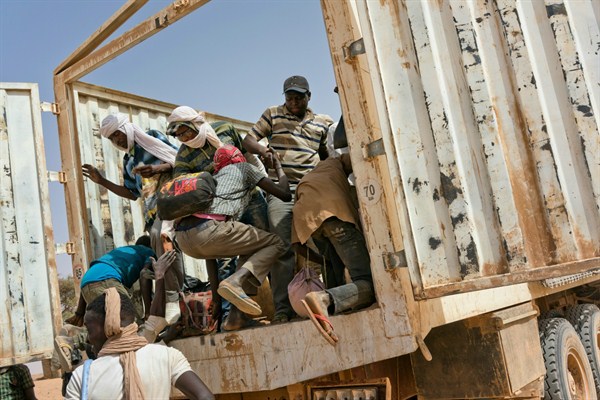Even as they escape poverty and violence at home, many African migrants find there is no promised land for them abroad. Learn more when you subscribe to World Politics Review (WPR).
Early one morning in April 2017, Etienne, a 36-year-old migrant from Cameroon, was awakened in his hotel room in Oran, a port city on the northwestern coast of Algeria, by a contingent of Algerian police officers raiding the hotel. They arrested Etienne and the dozens of other migrants from Sub-Saharan Africa who had also been living there.
The African migrants—a group that included men, women and some children—were eventually driven 1,500 miles to the Algerian border with Niger.
“Once we got there, the military police told us to start walking in the direction of the lights in the distance,” Etienne recalls. The migrants did as they were told, walking 12 kilometers in the darkness, feeling their way along a trail lined with pebbles, until they reached the desert town of Assamaka, in Niger.
It was a scene that has played out many times in recent years. Beginning in 2014, Algerian authorities have been expelling migrants from sub-Saharan Africa to Niger, citing concerns for Algeria’s security and a desire to crack down on the smuggling of drugs and weapons as well as human trafficking. Though these operations initially focused on citizens of Niger, last year they expanded to encompass migrants from across West Africa, and it appears the total number of affected migrants has risen considerably.
Algeria, once a haven for African migrants, is turning increasingly hostile to those seeking refuge. To learn more, read ‘We Can’t Stay Here’: Inside Algeria’s Mass Expulsions of Sub-Saharan Migrants for FREE with your subscription to World Politics Review.
In Israel, African Migrants Face An Uncertain Future
Israel has also seen a recent backlash against African migrants. In Tel Aviv, in particular, an influx over the past decade of 13,600 African asylum-seekers, largely concentrated in the city’s southern section, has created a new political fault line between “the two Tel Avivs.” In the wealthier northern half of the city, asylum-seekers are rarely seen, yet signs of support for them are seemingly everywhere. “Stop deportation!” proclaims a poster at the entrance to a bohemian cafe. In grittier south Tel Aviv, by contrast, there are fewer of these signs, but more of the people they refer to. On the side of some buildings, street art gives way to graffiti urging that the Africans be deported. “Go home,” is a popular refrain.
Israel’s debate over African migrants is increasingly becoming an identity crisis. To learn more, read Asylum-Seekers, or ‘Infiltrators’? Israel’s Identity Crisis Leaves African Migrants in Limbo for FREE with your subscription to World Politics Review.
[marketing]ofie[/marketing]
Morocco Wrestles With Its Position As A Migration Way-Station
Tensions over migration are also on display in Morocco, a key link in the Euro-African migration system. In the context of broader reforms in response to the 2011 Arab uprisings, King Mohammed VI announced a new migration policy in 2013 that stood in stark contrast with the kingdom’s previously repressive stance toward irregular migrants, surprising many local and international observers. The new policy claims to be progressive and respectful of human rights, and it has brought about tangible changes on the ground, including a regularization campaign and state-led integration measures. However, large-scale raids of irregular migrant settlements in northern Morocco in the years following the reforms suggest the limits of the sustainability and credibility of this new policy.
A legal void in Morocco’s migration policy leaves many migrants in limbo. Learn more, in Almost Home? Morocco’s Incomplete Migration Reforms for FREE with your subscription to World Politics Review.
African Migrants Find A Tenuous Welcome In Spain
Increasingly, the migrants that do continue onward to Europe are choosing Spain as their gateway to the continent. According to the International Organization for Migration, more than 22,500 migrants reached the Spanish coast by sea in the first seven months of 2018—more than in all of 2017. Another 307 have died trying. As Italy’s populist government continues to pursue hard-line anti-migrant policies, Spain replaced Italy as the top destination for Europe-bound migrants. The uptick has roughly coincided with the early days of Spain’s new Socialist, center-left government led by Prime Minister Pedro Sanchez, who was sworn into office in June 2018. Sanchez quickly articulated a more welcoming stance toward migrants, consistent with the historical positions of his Spanish Socialist Workers’ Party, known by its Spanish acronym, PSOE. At the same time, the party’s approach to the issue is more nuanced than recent media coverage has indicated, reflecting the intricacies of Spain’s history and domestic politics.
There are no easy solutions to migration policy, but in Spain, there is hope. Learn more, in Spain Is the New Magnet for Europe-Bound Migrants. How Will They Be Received? for FREE with your subscription to World Politics Review.
Discover more about the reality of African migrants in northern Africa and Europe, the moral dilemma African migrants pose to Israel, and so much more in the searchable library of World Politics Review (WPR):
- Why many African migrants flock to Algeria, and why that might be changing, in ‘We Can’t Stay Here’: Inside Algeria’s Mass Expulsions of Sub-Saharan Migrants
- Why some Israelis believe the country has a moral obligation to accept African migrants, and others want to deport them, in Asylum-Seekers, or ‘Infiltrators’? Israel’s Identity Crisis Leaves African Migrants in Limbo
- Why Morocco’s progressive migration policy is far from progressive in practice, in Almost Home? Morocco’s Incomplete Migration Reforms
- How Spain is dealing with a spike in African migrants, in Spain Is the New Magnet for Europe-Bound Migrants. How Will They Be Received?
[marketing]boilerplate[/marketing]

